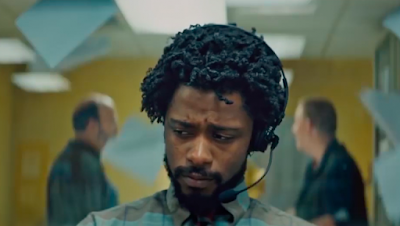Format: DVD from Sycamore Public Library on The New Portable.

The Oscars are this coming Sunday, and for the first time in a few years, I’m probably not going to watch them. The controversy over the host, dropping several of the awards out of the show…it’s all cooled me to the actual ceremony. The biggest issue, though, is that evidently there are a metric ton of movies from 2018 that were ignored or significantly snubbed in some categories. Because of this, I’m making sure to watch and review an increased number of those films on the blog in the coming months. To that end, I watched Sorry to Bother You today, and have found a film that seems to have been snubbed by pretty much everybody.
I don’t know that I can adequately explain everything that is necessary to understand Sorry to Bother You, because this is a movie that goes in about 100 directions at once. This is not a complaint, though, because for as strange as this movie is, it’s completely coherent and understandable at all times. Cassius “Cash” Green (Lakeith Stanfield) and his girlfriend Detroit (Tessa Thompson) live in the garage of Cash’s uncle (Terry Crews). Cash is behind on the rent and his uncle is on the brink of losing the house, so Cash gets a job as a telemarketer.
Things don’t go well initially until an older coworker (Danny Glover) tells Cash to use his “white voice.” By this, he doesn’t mean simply sounding white, but sounding as if he doesn’t have any problems and that everything in his life is perfect. Cash tries it out, and discovers that his white voice sounds nothing like him (and is voiced by David Cross), and moves product like nothing else. Soon enough, Cash’s money problems are a thing of the past and he’s moved up into the world of the Power Sellers where he learns that he’s not pushing product any more. Instead, he’s selling war, weapons, and slave labor for a company called WorryFree, run by CEO Steve Lift (Armie Hammer).
This leaves out so much. It leaves out the human/horse mutant hybrids being created by WorryFree to work harder, faster, and longer for essentially room and board. It leaves out Detroit’s collection of huge and bizarre earrings. It ignores the attempt to unionize the telemarketers, led by Squeeze (Steven Yeun) and the ominous eyepatch-wearing Mr. ______ (Omari Hardwick, white-voiced by Patton Oswalt). It leaves out the class struggle, the racism, and the relentless marketing of human misery.
Sorry to Bother You is many things. What it is more than anything is weird. Almost as much as it is weird, it is subversive as all hell. In fact, it’s completely transgressive as a film. This is a story that goes into strange and ugly taboos and doesn’t shy away from them, but holds them up and dances in front of them. For instance, shortly after Cash’s introduction to Steve Lift, Lift demands that he rap for everyone at his party. After all, Cash is black, so he has to know how to rap. He doesn’t, though, and his initial couple of bars are terrible and embarrassing until he starts screaming out the same repeated ethnic slur over and over and is instantly a hit.
This will seem like an odd comparison if you’ve seen both movies, but my initial point of comparison with Sorry to Bother You is to the film Four Lions. While both films have a common theme in the idea of social upheaval on some level, it’s more about just how far these films go over the line. There is a tendency in many filmmakers to push the envelope a little bit—to see where the current line of taste, decorum, and social acceptability is and to then nudge that line a couple of centimeters further out. Sorry to Bother You, much as Four Lions did, vaults over that line and sprints away from it, reveling in the fact that it doesn’t recognize that a line exists in the first place.
This is a reminder that I do the Oscar posts twice a week not as a celebration of Oscar and the yearly awards, but as a reckoning and an accounting. Oscar, for all of its efforts in moving away from the safety of the middle and of the tried-and-true hasn’t really ventured that far away. Twenty years ago, a film like The Lobster wouldn’t have been nominated for a screenplay award, and a couple of years ago, it was. Sorry to Bother You is a better movie in all aspects. The screenplay is better. It’s funnier, it’s more relevant, and it’s more important. It’s better acted top to bottom. It’s far more inventive in how it is filmed as well—all of Cash’s telemarketing calls put him literally into the homes of the people he is talking to, for instance. And yet, come Oscar time, here it sits, completely ignored. And in truth, if someone had remembered it, the nomination probably would have gone to Armie Hammer in a supporting role (no knock against him—he’s very good in this) instead of the screenplay, a nod to Boots Riley or the film editor Terel Gibson, or to the always-underrated Lakeith Stanfield.
I can already predict that this is going to come up when I eventually discus Best Original Screenplay for 2018.
Why to watch Sorry to Bother You: It’s surreal in all the best ways.
Why not to watch: If you don’t do weird, don’t do this film.
Sorry to Bother You, Boots Riley, comedy, fantasy, science fiction
